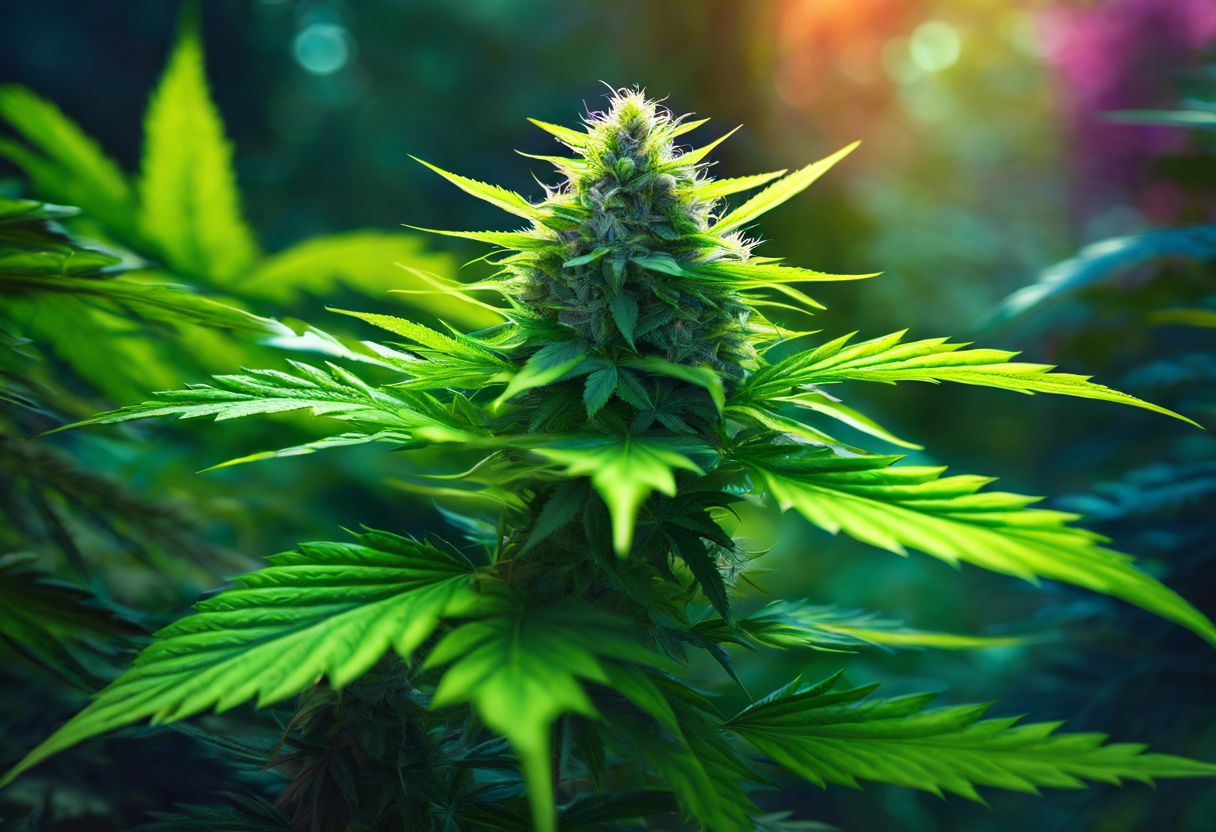Are you curious about the buzz surrounding THC-X, the latest twist in cannabinoid innovation? As cannabis aficionados seek out new experiences, THC-X emerges as a fresh player on the scene, promising an alternative to traditional delta 9 THC.
This blog post is your playbook to understanding what THC-X is all about – from its effects to legal status and how it differs from other cannabinoids. Let’s dive into this exciting trend that’s taking the cannabis community by storm!
Key Takeaways
- THC – X is a new kind of cannabinoid similar to the THC in marijuana but with different effects and less known about it.
- It might give you a happy, relaxed feeling and help with medical issues like pain or sleep problems.
- Laws for THC – X are not the same everywhere, so check your local rules before getting any.
Understanding THC-X

THC-X is catching the eyes of people who love cannabis. It’s a bit like the famous THC that gives you that good feeling, but it’s new on the scene and showing up in vape carts and tasty treats called edibles.
Scientists are really into studying things like THC-X because they want to know how it could help as a medicine.
You might know about CBD and its big buzz for not making people feel high while still being helpful. Well, THC-X also has something special going on with your body’s endocannabinoid system, just like CBD and regular THC do.
This means when you try out products with THC-X from online shops, it may make you feel relaxed or happy without some of the stronger effects linked to other types of THC found in marijuana plants.
The Effects of THC-X
THC-X is known for its psychoactive effects, which can induce feelings of euphoria and relaxation. It also has potential medical uses, particularly in treating chronic pain and anxiety.
Does THC-X Get You High?
Yes, THC-X can give you a high. It works on parts of the brain that make you feel good. People report feelings of joy and relaxation after using it. However, everyone is different, so some might get more high than others.
Keep in mind that with this high may come side effects like dry mouth or feeling anxious. Always start with small amounts to see how your body reacts. Remember, just because something is new doesn’t mean it’s better for everyone.
THC-X connects with special spots in your body called cannabinoid receptors which play a role in the effect you feel from cannabis plants. Like delta 9 THC, the part known for making people high from marijuana, THC-X can cause similar effects such as euphoria and an improved mood.
But be careful with doses; too much can lead to not-so-fun experiences like anxiety or paranoia for some folks.
Medical Uses of THC-X
While THC-X might give you a buzz, it also holds promise for health benefits. People are looking at THC-X for medical purposes, like easing pain or helping with sleep. It could help in the same way that FDA-approved medicines made from cannabinoids do.
These medicines treat things like nausea from cancer treatment.
THC-X might work on certain parts of your body to reduce swelling and discomfort. Research is still happening, but there’s hope that compounds found in cannabis can someday be part of regular treatments for different health problems.
Always talk to your doctor before trying new things for medical issues.
THC-X versus THC: Key Differences
Dive into the heart of cannabis curiosity as we compare the traditional THC with the budding trend of THC-X, highlighting what sets them apart for you, the savvy online cannabis consumer.
THC-X versus THC: Key Differences
| THC-X | THC |
|---|---|
| A newcomer on the cannabinoid scene, making waves with its unique effects. | The well-known, main psychoactive constituent in cannabis, responsible for the classic high. |
| Available in novel forms such as vape carts and edibles, catering to modern consumption trends. | Found in traditional marijuana products, from buds to oils. |
| Interacts with the body’s endocannabinoid system in ways still under scientific exploration. | Effects thoroughly studied, with established interaction with cannabinoid receptors. |
| Legal status may vary as it’s a new substance and not yet widely legislated. | Legality depends on the state and federal laws, with more established regulations. |
| Research on medical uses is emergent, showing promise but requiring more data for definitive claims. | Medical benefits more documented, with FDA-approved drugs like dronabinol and nabilone. |
| Its market is growing among those seeking alternative cannabis experiences and benefits. | Dominates the cannabis market, with a long history of recreational and medicinal use. |
Understanding these differences is crucial, and it’s not just about the high but how they influence the therapeutic landscape of cannabinoids. Now, let’s explore the synthetic nature of cannabinoids like THC-X.
The Synthetic Nature of Cannabinoids Like THC-X
As we delve into the synthetic nature of cannabinoids like THC-X, it’s essential to understand that these compounds are artificially created in a lab setting rather than being derived directly from the cannabis plant.
This process involves altering the chemical structure of natural cannabinoids to produce new variations with specific properties. The creation of synthetic cannabinoids allows for precise control over their effects and potential therapeutic benefits, paving the way for innovative developments in cannabinoid-based treatments.
As research continues to explore the potential of these synthetic compounds, they offer a promising avenue for enhancing targeted medical applications and delivering unique experiences to consumers.
By using advanced scientific techniques, manufacturers can tailor the properties of synthetic cannabinoids to meet distinct consumer needs and provide alternative options for cannabinoid therapy.
These advancements hold significant promise in expanding the range of available cannabinoid products while offering tailored solutions for various health conditions and individual preferences – ultimately contributing to an evolving landscape of cannabis consumption and medicinal use.
Legal Status of THC-X
THC-X’s legal status is a bit of a gray area. This cannabinoid might not be explicitly illegal, but it also may not be completely approved by the authorities yet. The legality of THC-X varies from state to state in the United States, and other countries have their own regulations on it.
Because of this, if you’re considering trying THC-X products, it’s essential to check your local laws first before purchasing or using them.
While researching THC-X’s legal status can feel complex, understanding your local regulations will help you make informed decisions about its purchase and use. Remember that staying within the boundaries of the law is crucial for both personal safety and legal compliance when exploring new cannabinoid trends like THC-X.
Other Forms of THC to Explore
Conclusion
In conclusion, exploring THC-X reveals a new dimension in cannabinoid therapy. Its unique effects and legal status make it an intriguing trend to watch. As cannabis consumers, understanding the differences between THC-X and THC can help you make informed choices.
Keep an eye on the evolving landscape of cannabinoids for potential benefits and cautions. Embrace curiosity as you navigate this emerging cannabinoid territory with a mindful approach.
To learn more about cannabinoid synthetics, such as Delta-8 and their comparison to THC-X, visit Is Delta-8 Synthetic?.
FAQs
1. What is THC X?
THC X refers to a new type of cannabinoid that people are using for its euphoric effects similar to other intoxicating cannabinoids like delta 8 thc and delta 9.
2. Can THC X help with pain relief?
Yes, some users report that THC X has pain-relieving properties, much like medical cannabis, which can help patients dealing with discomfort.
3. Will using THC X show up on a drug test?
It’s possible that THC from any psychoactive compound including THC X could show up in drug tests because they often look for signs of tetrahydrocannabinol (THC) use.
4. Is it legal to use recreational substances like Delta-8 or Delta-9 THCs everywhere in the USA?
No, not all places allow the use of these psychoactive substances and their legality varies by state; it’s important to check local laws before using them as The Food and Drug Administration (FDA) hasn’t approved many of these compounds for widespread use.
5. Are there other ways to take cannabinoids besides smoking or vaping?
Sure! Besides vaporizers, you can also find cannabinoids in various forms such as oils, edibles, and capsules depending on what your health care professional thinks is right for you.
6. Should I talk to my physician before trying products containing cannabinoids like CBN or Delta-9-tetrahydrocannabinol (THC)?
Absolutely! Always get advice from your physician or another qualified health care professional before trying new substances since they may impact everyone differently based on diagnosis and individual sense.






